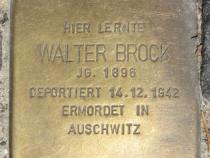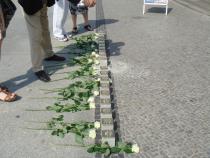Jakob Walter Brock was born on 5 June 1896 in Berlin. He was the only son of Dr Isidor Itzig Brock (1858–1940), a lawyer and imperial counsel, and his wife Margarete Brock, née Graetz (1874–1942), who had married in Berlin in 1894. When Walter was born, the Brock family lived in an apartment at Friedrichsstraße 112b. Around the turn of the century they moved into a new apartment at Chausseestraße 123. Dr. Isidor Brock was an attorney at the regional court Landgericht I and active in all three regional courts after the system’s restructuring in 1899.
Few records have survived of Walter Brock’s home life, childhood, and youth in imperial Berlin. But it is most likely that his parents belonged to the city’s Jewish Community. Having gained his high school diploma, Walter Brock enrolled to study governance and public policy at Friedrich Wilhelm University Berlin’s faculty of law. Unfortunately, nothing is known about his professional development after graduation; neither do any sources exist to tell of Walter Brock’s life in Berlin during the Weimar Republic.
The mechanisms gradually introduced from 1933 on to persecute Jews – or all those considered to be Jews under the Nazi state’s Nuremberg Laws – soon hit Walter Brock and his family. They included numerous measures designed to discriminate against and exclude Jews from society, to deprive them of their civil rights and oust them from the nation’s business and economic life. The Nazis’ “Law on Admissions to the Bar” of 7 April 1933 had a critical impact. Although Walter’s father Isidor was theoretically able to continue practising due to a special regulation for “senior lawyers” who had gained admission before 1914, in practice he lost his notaryship, stopped receiving public briefs, and was no longer considered for sequestrator, receiver, or executor duties. He was effectively forced out of the profession as his income dwindled. The “5th Ordinance to the Reich Citizenship Law of 27 September 1938” placed a general ban on Jewish lawyers. At the time of the census in May 1939, Walter Brock lived with his parents, who had moved in 1937 from the apartment at Chausseestraße 123 that had been their home for many years to one at Flotowstraße 8 in the Hansaviertel district. After his father’s death in September 1940, Walter Brock took care of his mother. By the early 1940s at the latest, his life in Berlin had become a struggle to survive. A police decree of 1 September 1941 “concerning the identification of Jews” was just one of many measures that had drastic repercussions. It meant that Walter Brock and his mother could not leave their home without wearing the “yellow star” branding them Jews.
Having been stripped of their rights, they faced deportation: On 1 October 1941 the Gestapo informed the Berlin Jewish Community of the imminent “resettlement” of Berlin’s Jews. Walter Brock and his mother received a deportation notice in winter 1942. They were interned in one of the assembly camps in Berlin and deported from there on 14 December 1942 with the “25th transport to the east” to Auschwitz extermination camp. Walter Brock’s 68-year-old mother was probably murdered immediately on arrival in Auschwitz. Walter Brock, then aged 46, was registered as “able to work” in the deportation list. It is likely that he was selected to perform forced labour in the camp before he was murdered. In any case, he was not among the few survivors of Auschwitz.




